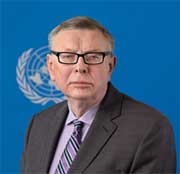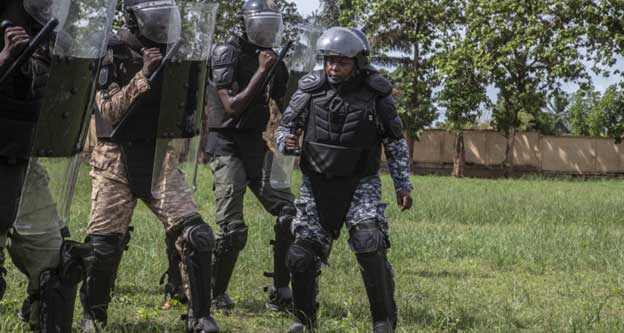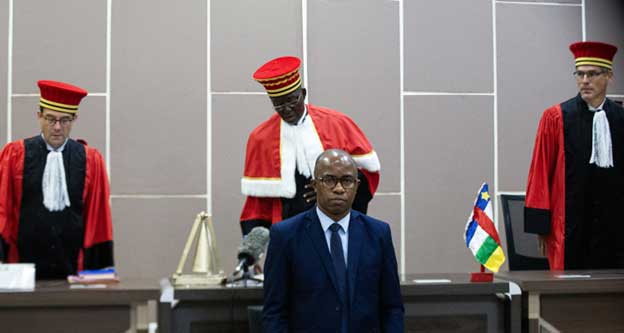UNITED NATIONS, May 06 (IPS) – The United Nations Office for the Rule of Law and Security Institutions (OROLSI) helps promote the rule of law, security and peace in conflict-affected countries.
In an interview with Africa Renewal’s Kingsley Ighobor, Alexandre Zouev talks about OROLSI’s work in Africa, the rule of law on the continent, the recent coup d’état and its impact, and the role of youth in promoting peace and development.
Below is an excerpt.
What is the rule of law and security institutions?
We mainly deal with five main areas: the Police Sector, the Department of Justice and Correctional Services, the Disarmament, Demobilization and Rehabilitation Section, the Security Sector Reform, and the Mine Action Department.

How do you assess the current state of the rule of law in Africa?
As you know, we have recently witnessed global geopolitical tensions that are not conducive to the rule of law. The past year or two has seen a global erosion of the rule of law in many, if not most, countries. According to the latest data, up to 6 billion people around the world live in countries where the rule of law is weakened. We are concerned about this trend.
When it comes to Africa, particularly sub-Saharan Africa, the rule of law has deteriorated in more than 20 countries. However, it must be noted that around 14 African countries, including Kenya, Liberia, Tanzania and Ivory Coast, have successfully strengthened the rule of law in the past 12 months.
Do you think geopolitical challenges are to blame for the deterioration of the rule of law in African countries?
Of course, global challenges to peace and security have implications for the rule of law. Many African countries continue to rely on external technical assistance to conduct elections and run judicial institutions and prisons.
Many of these situations also have internal factors, such as lack of access to justice, lack of adequately trained law enforcement, and lack of an independent judiciary. So it’s a combination of regional and global instability and internal factors.
Military coups seem to be happening again, especially in West Africa.
you are right. We have seen the military seize power, particularly in the Greater Sahel region. It is not conducive to the rule of law when the military assumes the role of the political and judicial system instead of the civilian justice system.
How are you helping these countries address these challenges?
As I mentioned earlier, Africa, particularly sub-Saharan Africa, is our main focus. And that’s for a variety of reasons. These include gaps in the rule of law in some countries and specific development challenges. Poverty is generally associated with crime and dysfunctional justice systems. Budget deficits and lack of effective fiscal management prevent any state from allocating adequate resources to the rule of law areas. In an ideal situation, the rule of law requires sufficient resources, but not all states can provide them.
For example, do you collaborate with civil society organizations in each country?
We are committed to working with civil society organizations. In our view, women and young people are very important agents of peace. We have a number of strategic frameworks with the African Union (AU). The AU and the EU are the two main regional organizations that partner with UN peacekeeping operations, including my office.
At the subregional level, we have varying degrees of involvement. For example, we work with the following companies: Intergovernmental authorities for development (IGAD), United Nations West Africa and Sahel Office(Unowas), Economic Community of West African States (Ecowas), Southern African Development Commission (SADC), and other subregional organizations.

How important is security sector reform (SSR) to the rule of law?
This is a small but very important part of my office, as the SSR deals with sensitive military and security issues that sometimes have important political implications. And not all governments want to be scrutinized.
Supporting SSR requires reliable statistics. For example, how much is spent on the military, civil defense, and intelligence? At the request of states, we help provide them with best practices and ways to build security sector capacity. Masu. This type of work is carried out with full respect for the host country’s independent decision-making, sovereignty, confidentiality of the process and non-disclosure of information to third parties.
Would you like to support a country that does not have peace operations?
absolutely. OROLSI has system-wide service provider authority. We are increasingly focusing on more cost-effective prevention. One of the main tools we have developed to do this is the Organizational Development Advisory Program. We piloted this program in the Sahel region. We deploy institutional development advisors to help governments and the United Nations system address the key challenges facing the rule of law and security institutions.
Therefore, IDA is not transactional or mission-driven like aid. We rely on standing capacity within the United Nations system. We work with other UN partners, particularly the United Nations Development Program (UNDP), the United Nations Office for Disarmament (UNODA) and the Office of the United Nations High Commissioner for Human Rights (OHCHR). The rule of law requires the promotion of a human rights culture. Therefore, IDA helps consolidate collaboration between government agencies. So far, it has proven to be very successful.
Many countries are confronting violent extremist groups like Boko Haram. What role do you play in addressing this issue?
Peacekeeping operations were not established in the UN system for counterterrorism operations. Therefore, we are working closely with. counterterrorism bureau (OCT), and Counterterrorism Committee Secretariat (CTED) Established by the Security Council.
Almost all UN agencies and departments are involved in preventing violent extremism. We are no exception. Our comparative advantage is to build host countries’ capacity to counter terrorism and prevent violent extremism through strengthening the rule of law and security institutions, and through programs that support affected populations, such as community policing and DDR. There is a particular thing.
If you look at some terrorist organizations like ISIS, it’s not just men and women fighting with weapons. They have brainwashed families and in some cases children. Some have left the country, but reintegrating them is not easy.
Have you seen positive outcomes from your work in Africa?
In general, we get a lot of resources from the UN’s assessed budget and off-budget contributions from donors, but that is not enough.
Investments in all kinds of reforms and capacity building in the rule of law area are multi-year efforts. You can’t do it overnight, in a week, or in a month. We are moving in the right direction, but probably not at the speed I would like.

Is your job complicated by the closure of peacekeeping operations in Mali and other African countries?
It is not the closure or liquidation of missions that complicates our work. That’s how it happened under a hostile environment and an unrealistically short schedule. Exiting, liquidating, phasing out, or downsizing a mission can be difficult. However, missions in Liberia, Ivory Coast, and Mozambique were successfully completed.
Countries like Mali and Sudan are probably in a tougher situation. The government gave the Security Council just six months to finish the mission in Mali, one of its largest, with about 13,000 personnel, thousands of vehicles and an armored aircraft carrier. . It was almost a mission impossible, but we managed to do it.
What role do you think African youth can play in promoting peace and development on the continent?
As you know, the Secretary General youth envoy. I believe in investing in our future, represented by young people. Whether in Africa, Asia or Europe, it is important to involve young people, not only for my generation, but also for my children’s and grandchildren’s generations.
When young people are educated, they become important agents of change. I’m not necessarily talking about political education or legal education. In some cases, you may also participate in sporting or cultural events.
Can you imagine an Africa without war?
Dr. Martin Luther King said: “I have a dream.” I too have a dream of closing this store someday. If there were no wars or conflicts, there would be no need for peacekeeping.
If we look at specific developments in sub-Saharan Africa, the Maghreb countries of northern Africa, we see what has happened in Libya over the past few years. Find out what’s happening in Sudan. In Somalia, there is still ongoing conflict between al-Shabaab and the Somali government.
The reality is that these conflicts cannot be stopped overnight. As long as peacekeeping operations exist, we should probably invest more in certain types of peacekeeping operations, led by the AU. I believe that Africa’s problems can be solved by Africans.
We need partnerships with regional organizations such as the EU and AU, as well as other sub-regional organizations in Africa. The private sector, including African business leaders, should play a special role. Some of them are already investing in peacebuilding and sustainable economic systems.
We need to bring out the best in everyone.
sauce: African Revitalization, United Nations
Africa Renewal is a United Nations digital magazine that covers Africa’s economic, social and political development, the challenges facing the continent and their solutions by Africans themselves, including support from the United Nations and the international community.
IPS United Nations Secretariat
Follow @IPSNewsUNBureau
Follow IPS News United Nations Secretariat on Instagram
© Inter Press Service (2024) — All rights reservedSource: Interpress Service











